
When Muslim Turks conquered the land trade routes from Europe to Asia, Europeans began to look for sea trade routes.
These attempts were relatively few as the only ones who could afford to finance them were wealthy individuals, or kings, such as Spain's Ferdinand and Isabella who underwrote Columbus' voyages, or Portugal's Manuel the First who underwrote Vasco da Gama's voyages.
These trips were extremely risky, being subject to piracy, storms, shipwrecks, starvation, disease, wars, and native attacks.
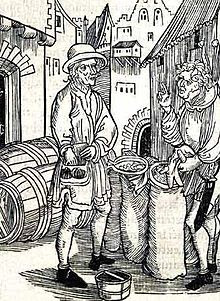
This changed the invention of "companies."
"Companies" have a significant history. During the Middle Ages, there were no for profit companies, as it was considered the "sin of usury" to pay or receive interest.
The Middle Ages did have:
- religious confraternities;
- partnerships;
- tradesmen associations;
- craft guilds; and
- merchant guilds.
These groups, though, were for spiritual and educational purposes, or were for controlling who could conduct business in a town, issuing very detailed rules.
They did not have large amounts of capital to finance large projects or overseas ventures.
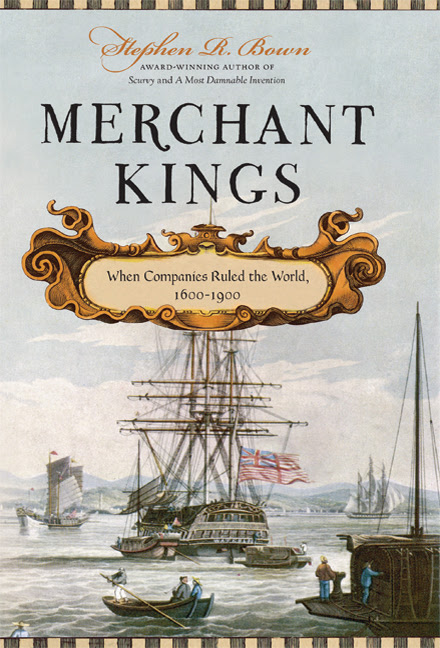
After the Reformation, Protestant countries formed the first "joint–stock" companies.
A joint–stock company was much like modern-day crowd–sourcing or crowd–funding.
Any individual, such as a carpenter, blacksmith, baker, or mason, could invest in a ship sailing to the Far East in search of valuable spices.
When the ship returned full of nutmeg, cinnamon, tea, or other trade items, investors would receive part of the profit.
Ships would sometimes sink in storms or be captured by pirates. To cover these losses, insurance companies were formed.
A key feature of joint stock companies was limited liability, meaning those who invested only risked the amount they put in.
There was no additional legal responsibility for losses associated with the company.
Joint stock companies allowed common people to take some of the power away from the wealthy royal elites, thus empowering the individual.
Where individuals were moral, it resulted in capitalism with a conscience; where individuals were immoral, companies were involved in drug trafficking and the slave trade.
A delicate balance of competing motivations drove companies on, namely, greed versus the gospel.
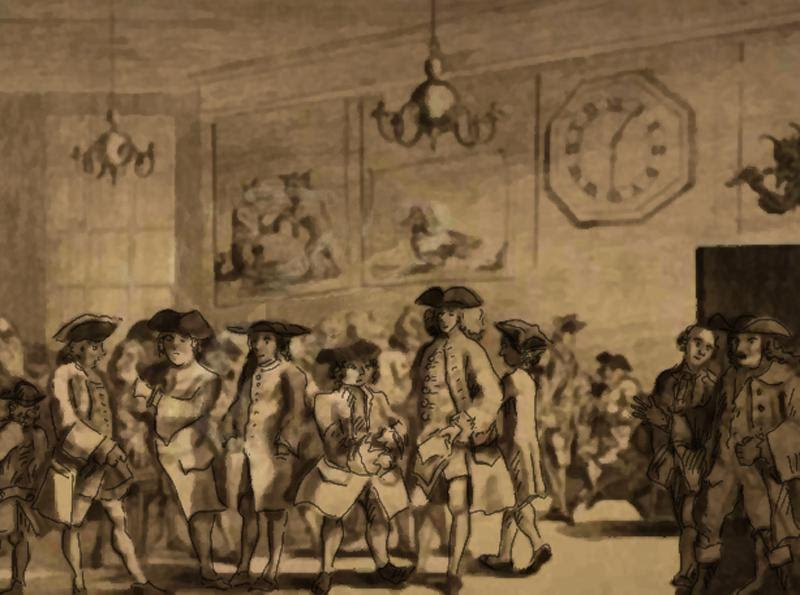
In countries with monarchies, kings would grant royal charters to joint stock companies, granting them monopoly trading and colonizing rights.
This was a win-win arrangement for monarchs, as they risked nothing, yet received a percentage of the profits what came in.
What was considered the first modern joint-stock company, and how was it formed?
Henry the Eighth had a son by his wife Jane Seymour, Edward the Sixth.
Henry died in 1547. Four years later, in 1551, nine-year-old King Edward the Sixth enlisted Sebastian Cabot to find passage to China.
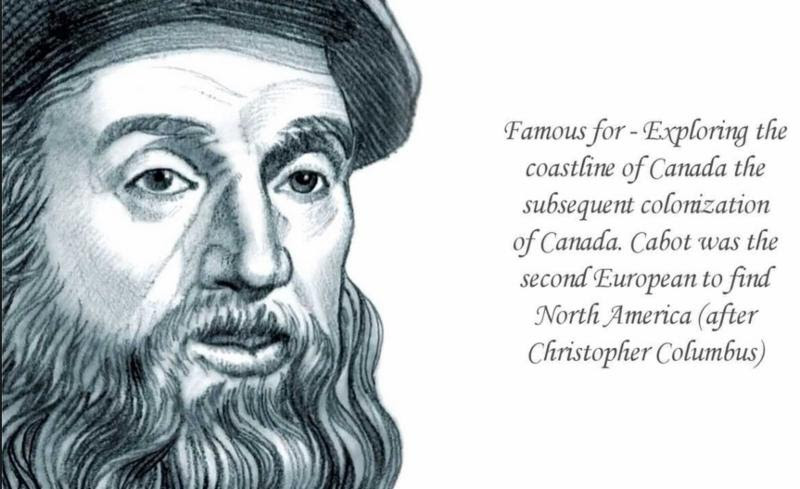
Sebastian Cabot was the son of Italian explorer John Cabot, who decades earlier had sailed for Henry the Seventh of England in 1497. Cabot was renown for discovering and exploring the coast of North America.
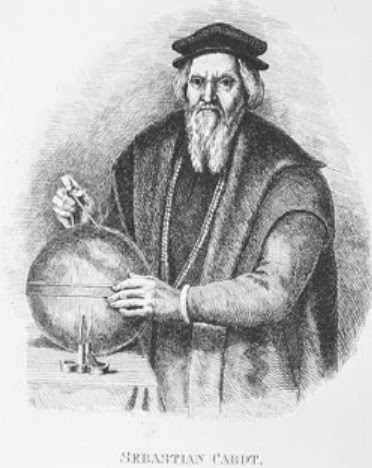
John's son, Sebastian Cabot helped form the Company of Merchant Adventurers to New Lands in 1553. It is considered one of the very first "companies."
It had 240 investors, called "adventurers":
"Divers very good subjects of this Realm of England in the latter end of the reign of ... King Edward the Sixth ... did at their adventure ... for the glory of God, the honor and increase of the revenues of the Crown, and the common vitality of the whole Realm of England, set forth three ships for the discovery by sea, of ... lands ... unknown."

The Charter gave:
"Instructions ... of the intended voyage for Cathay - China, compiled ... by the right worshipful Sebastian Cabot, Esquire, governor of the Company of the Merchants Adventurers for the Discovery of Regions, Dominions, Islands and Places Unknown the 9th day of May, in the year of our Lord God, 1553."
The Charter had several items, such as:
- 7. Item- that the merchants ... shall daily ... describe ... the navigation of every day and night, with the points, and observation of the lands, tides, elements, altitude of the sun, course of the moon and stars ...
- 13. Item- that no blaspheming of God, or detestable swearing be used in any ship, nor communication of ribald, filthy tales, or ungodly talk ... neither dicing, carding, tabling, nor other devilish games ... provoking of God's most just wrath ... that morning and evening prayer ... be read and said in every ship daily by the minister ... The Bible or paraphrases to be read ... and Christianity to God's honor, and for His grace to be obtained ...
- 23. Item- for as much as our people, and ships may appear unto them strange ... it is to be considered, how ... learning much of their natures and dispositions, by some one such person, as you may first either allure, or take to be brought aboard your ships, and there to learn as you may, without violence or force, and no woman to be tempted, or entreated to incontinency - unchastity ...
- 24. Item- the person so taken, to be well entertained ... and appareled, to be set on land, to the intent that he or she may allure others to draw nigh to shew the commodities; and if the person taken may be made drunk with your beer, or wine, you shall know the secrets of his heart ...
- 26. Item- every nation and region is to be considered advisedly, and not to provoke them by any disdain, laughing, contempt, or such like, but ... with all gentleness, and courtesy ...
- 28. Item- if people shall appear gathering of stones, gold, metal, or other like, on the sand, your pinnesses (ships) may draw nigh ... but keep you out of danger ...
- 33 Item- no conspiracies, factions ... which be the very seeds, and fruits of contention, discord, and confusion, by evil tongues to be suffered ... and all other ungodliness to be chastened charitably with brotherly love ... for duty and conscience sake towards God ...
- Every person ... praying the living God, to give you his grace, to accomplish your charge to his glory ...
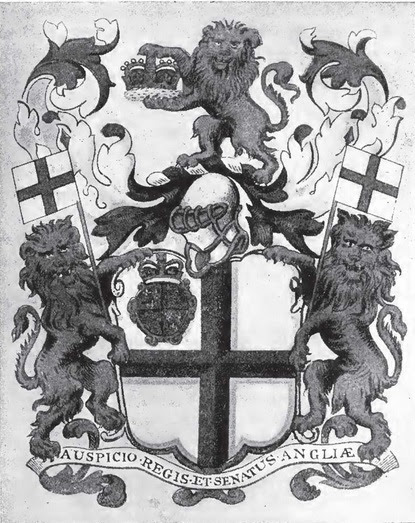
... In witness whereof I, Sebastian Cabot, Governor aforesaid, to these present ordinances, have subscribed my name, and put my scale, the day and year above written."

The Company of Merchant Adventurers fitted out three ships and set sail to find China and the Indonesian Moluccas Spice Islands. Unfortunately, they made the tragic mistake of sailing north over Russia.
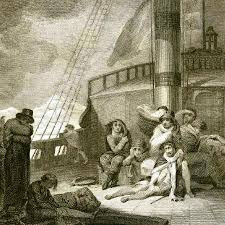
Separated in a storm in the North Sea, two ships became trapped in ice, resulting in everyone on board freezing to death. The third ship, commanded by Richard Chancellor, made it as far as the White Sea and the mouth of the Dvina River.
Russians took Richard Chancellor to Moscow where he was received by Tsar Ivan the Terrible.
Richard Chancellor returned to England in 1554 with a letter from the Tsar welcoming trade.
The company was rechartered under Queen Mary the First in 1555 as the Muscovy Company.
Between 1589 and 1600, Richard Hakluyt compiled The Principal Navigations, Voyages, Traffiques and Discoveries of the English Nation, which had a chapter on Russian history:
"THE MUSCOVY COMPANY AND THE NORTH-EASTERN PASSAGE ...
Vladimir ... became sole governor of Russia ... This man beginning at length to loath ... the ethnic religion, and the multitude of false gods,
applied his mind unto the religion of Christ, and having taken to wife Anna sister unto Basilius and Constantinus Emperors of Constantinople, was together with his whole nation, in the year of Christ 988, baptized, and embraced the Christian religion."
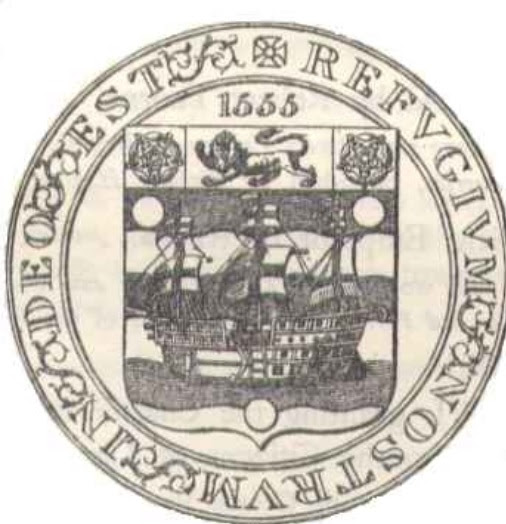
Richard Hakluyt's book included the report of adventurer Richard Chancellor:
"The book of the great and mighty Emperor of Russia and Duke of Muscovia, and of the dominions orders and commodities thereunto belonging: drawn by Richard Chancellor:
For as much as it is ... necessary for all those that mind to take in hand the travel into far or strange countries ... I now thought good to make a brief rehearsal of ... my travel in Russia ...
Russia is very plentiful both of land and people, and also wealthy for such commodities as they have ...
They carry to the city of Moscow in such abundance that it is wonder to see it. You shall meet in a morning seven or eight hundred sleds coming or going thither, that carry corn, and some carry fish ... Some ... from ... a thousand miles off ...
Those which come so far dwell in the North parts ... where the cold will suffer no corn to grow, it is so extreme. They bring thither fishes, furs, and beasts skins ...
Moscow itself is great: I take the whole town to be greater then London with the suburbs ... Their houses are all of timber very dangerous for fire.
There is a fair castle ... and ... nine fair churches, and therein are religious men ... with divers Bishops ...
This Duke is Lord and Emperor of many countries, and his power is marvelous great. For he is able to bring into the field two or three hundred thousand men: he never goeth into the field himself with under two hundred thousand men ...
... The poor is very innumerable, and live most miserably: for I have scene them eat the pickle of Herring and other slinking fish: nor the fish cannot be so stinking nor rotten, but they will eat it and praise it to be more wholesome then other fish or fresh meat.
In mine opinion there be no such people under the sun for their hardness of living." 

Richard Chancellor's report on Russia continued:
"Well, I will leave them in this point, and will in part declare their Religion. They do observe the law of the Greeks with such excess of superstition, as the like hath not been heard of.
They have no graven images in their Churches, but all painted, to the intent they will not break the commandment: but to their painted images they use such idolatry, that the like was never heard of in England ...
They say we be but half Christians ... therefore they call themselves more holy then us ...
They have the Old and New Testament, which are daily read among them: and yet their superstition is no less. For when the Priests do read, they have such tricks in their reading, that no man can understand them, nor no man giveth ear to them.
For all the while the Priest readeth, the people sit down and one talks with another ... When the Priest is at service no man sitteth, but gaggle and cackle like so many Geese ...
... And as for their prayers they have but little skill, but use to say ... Lord have mercy upon me.
For the tenth man within the land cannot say the Pater Noster - Our Father.
And as for the Creed, no man may be so bold as to meddle therewith but in the Church: for they say it should not be spoken of, but in the Churches.
Speak to them of the Commandments, and they will say they were given to Moses in the law, which Christ hath now abrogated by his precious death and passion: therefore, -- say they -- we observe little or none thereof.
And I do believe them. For if they were examined of their Law and Commandments together, they should agree but in few points.
They have the Sacrament of the Lord's Supper in both kinds, and more ceremonies then we have. They present them in a dish in both kinds together, and carry them round about the Church upon the Priest's head ...
They be great offerers of candles, and sometimes of money, which we call in England, soul pence, with more ceremonies then I am able to declare ..."
Chancellor concluded:
"They have four Lents in the year ... Howbeit I believe there be in no other country the like people for drunkenness ...
Saint Philip, Saint Peter, Saint Nicholas, and Saint Clement ... they four be the principal! and greatest Saints in that Country ...
In these Lents they eat neither butter, eggs, milk, or cheese; but they are very straightly kept with fish, cabbages, and roots ...
Their drink is like our penny Ale, and is called Quass.
They have service daily in their Churches; and ... go to
service two hours before day, and that is ended by day light ...
You shall understand that at every dinner and supper they have declared the exposition of the Gospel of that day: but how they wrest and twine the Scripture."
The Muscovy Company not only sent envoys to Russia, but also sent them to travel south of Russia to the Safavid Persian Empire.
This began numerous trading visits of English merchant brothers, Robert and Anthony Sherley, with Shah Abbas I at his new capital of Isfahan.
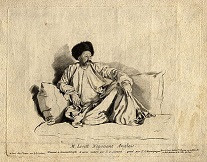
In 1581, England started the Levant Company which traded with Turkey's Ottoman Muslims.
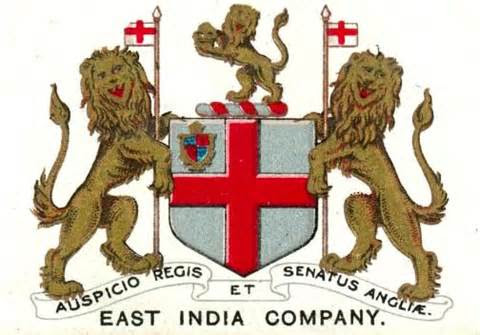
In 1600, the British East India Company was formed.
Eventually, companies were formed to trade with
- Africa,
- the Mediterranean, and
- America.
In 1602, the Netherlands formed the most financially successful joint-stock company - the Dutch East India Company.
It is considered the first multinational corporation in the world, with more trade in Asia between 1602 and 1796 than all other European companies combined.
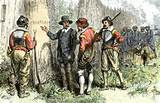
In 1585, Sir Walter Raleigh sailed for the "Virgin" Queen Elizabeth to begin a colony in her honor named "Virginia." His settlement was on Roanoke Island.
The attack on England of the Invincible Spanish Armada in 1588 prevented supplies from being sent to Roanoke.
When Raleigh again sent supplies in 1589, the colony had disappeared.
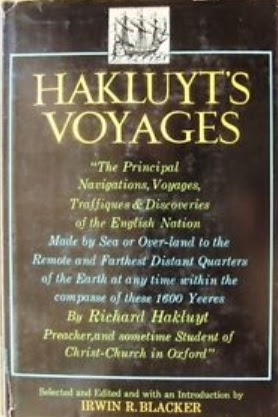
Though Raleigh still technically held the patent to colonize Virginia, his charter was no longer enforced, as his venture had not brought in any money.
Nearly two decades elapsed with no attempts, till Richard Hakluyt began petitioning the king to grant another patent to colonize Virginia.
Hakluyt solicited wealthy individuals to fund the Virginia Company.
Many English investors declined, as Sir Walter Raleigh had lost a fortune, estimated at 40,000 pounds sterling, in his failed attempt to settle the Roanoke Colony in Virginia.
Other investors were only interested in colonizing parts of Ireland.
One investor in the Virginia Company was the Earl of Southampton, who also financed Shakespeare.
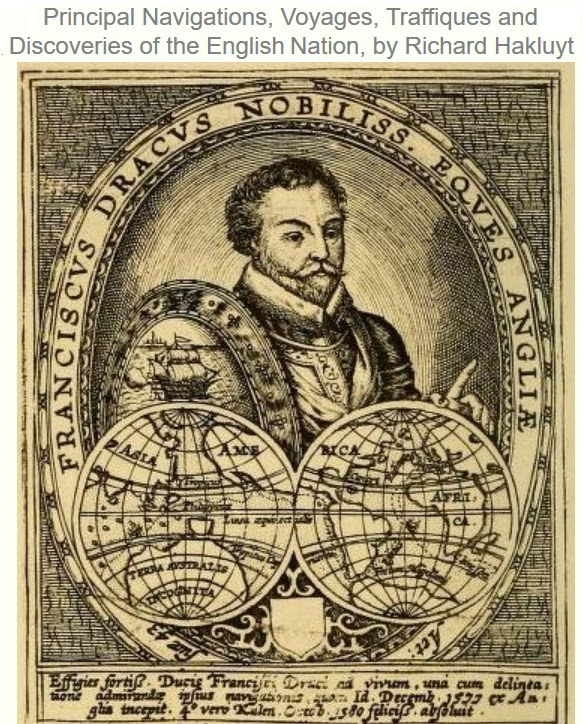
Hakluyt's research and writings also provided resource material to the authors of the day, including Shakespeare.
Hakluyt's persistent advocating for colonization led Scottish historian William Robertson to give him credit: "England is more indebted to him - Richard Hakluyt - for its American possessions than to any man of that age."
Hakluyt is the one who recommended Rev. Robert Hunt be the Virginia colony's chaplain.
A friend of Richard Hakluyt was Bartholomew Gosnold, who had been an English privateer like Sir Walter Raleigh and Sir Francis Drake.
Gosnold's wife Mary was the granddaughter of the powerful Sir Andrew Judd, the Lord Mayor of London.
Gosnold's family was also friends with Sir Francis Bacon, who developed "the scientific method."
Gosnold led the first expedition to the Massachusetts area in 1602, having heard about the abundance of fish which could be sold in English markets. He arrived at Cape Elizabeth, present-day Maine, in May of 1602. He sailed south to Provincetown, Massachusetts, where he gave Cape Cod its name.
Gosnold named the island of Martha's Vineyard after his infant daughter that died.
He established a small post on the secluded Cuttyhunk Island, Massachusetts, but settlers abandoned it before winter, fearing the scarcity of supplies. Gosnold returned to England.
A monument to Bartholomew Gosnold stands on shore of Cuttyhunk.
Gosnold decided to try one more time. He and other organizers reputedly conceived the idea for what became the successful Virginia Company Colony around the fireplace of his home, called Otley Hall.
The home still stands in the rolling countryside of Suffolk, and is considered one England's top 20 historic houses.
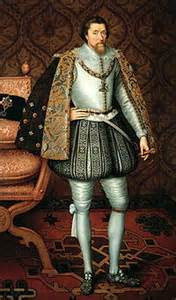
Gosnold approached King James the First, for whom the King James Bible was named, asking for exclusive permission.
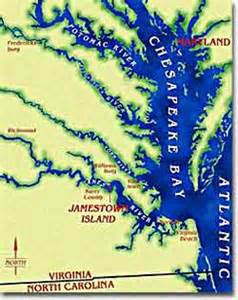
In 1606, King James granted a charter to the London Company and Plymouth Company, together referred to as the Virginia Company:
"Greatly commending ... their desires for the Furtherance of so noble a Work, which may, by the Providence of Almighty God, hereafter tend to the Glory of His Divine Majesty, in propagating of Christian Religion to such People, as yet live in Darkness and miserable Ignorance of the true Knowledge and Worship of God."
Gosnold recruited notable individuals, including Captain John Smith, who was renown for fighting the armies of Ottoman Sultans Mehmed the Third and Ahmed the First in the Long Turkish War.
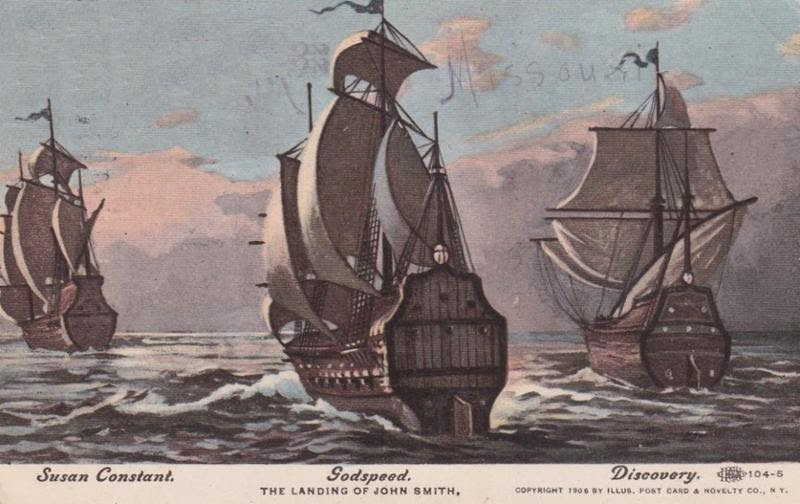
The Virginia Company's three ships set sail in late 1606, with:
- Bartholomew Gosnold as the captain of the Godspeed;
- Christopher Newport as captain of the Susan Constant; and
- John Ratcliffe as captain of the Discovery.
After a 5 month journey, which included a stop in Puerto Rico, they entered Chesapeake Bay and made landfall on April 26, 1607 at Cape Henry, named for Prince Henry of Wales.
Upon disembarking, the settlers' first act was to erect a Christian cross.
Their Anglican Chaplain, Rev. Robert Hunt, offered prayer, as portrayed in the CBN film First Landing the Movie -- 2007 Award of Excellence Winner, Michael Little, executive producer.


Sailing up the "James River," named after King James, they established "Jamestown" on May 13, 1607 – the first permanent English settlement in the New World.
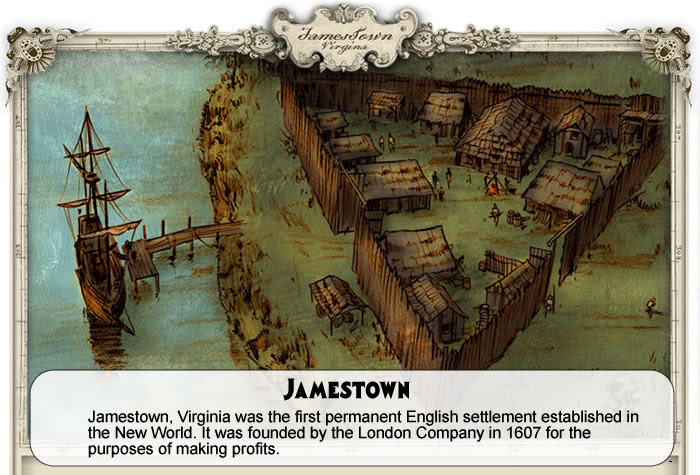
Bartholomew Gosnold helped design the layout of Jamestown, but died after only four months, on August 22, 1607, being buried outside the fort.
Gosnold's brother accompanied them on the voyage, but he drowned in a storm trying to cross Boston Harbor to Hog Island - present-day Spinnaker Island.
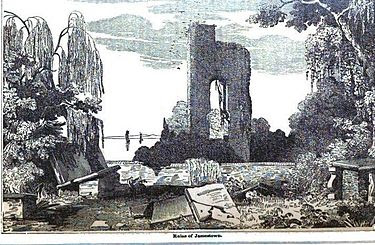
In the next three years, settlers experienced malaria from mosquito filled swamps, hunger, exposure, and Indian attacks.
During the "starving time" of 1609-1610, only 60 of the 500 settlers survived.
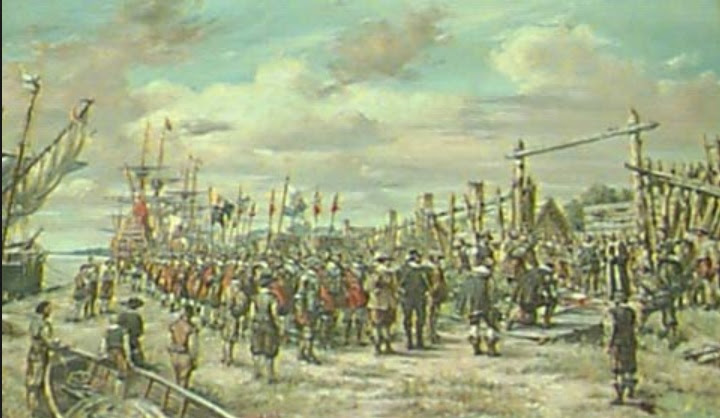
Jamestown would have been abandoned had it not been for the timely arrival of Thomas West, Lord Delaware, June 10, 1610, who brought supplies and insisted the settlers not to give up.

1610 was the same year that Spanish Catholic priests founded the city of Santa Fe -- meaning "holy faith" -- in present-day New Mexico, building San Miguel Chapel, which is considered the oldest continuously standing church structure in the United States.
Jamestown's first church service was described by Captain John Smith in his Advertisements for Unexperienced Planters, published in London, 1631:
"When I first went to Virginia, I well remember, we did hang an awning -- which is an old sail -- to three or four trees to shadow us from the sun, our walls were rails of wood, our seats unhewn trees, till we cut planks, our Pulpit a bar of wood nailed to two neighboring trees,
in foul weather we shifted into an old rotten tent, for we had few better ... this was our Church, till we built a homely thing like a barn ...
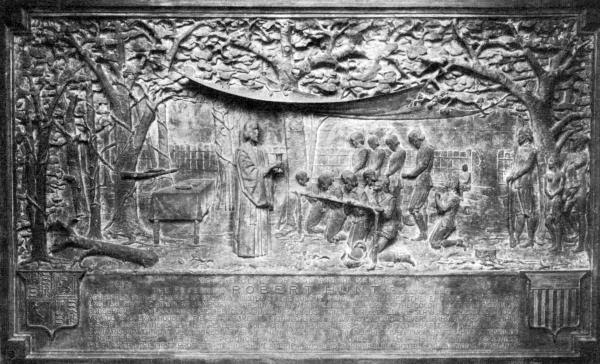
... We had daily Common Prayer morning and evening, every day two Sermons, and every three months the holy Communion, till our Minister -- Robert Hunt -- died, but our Prayers daily, with an Homily on Sundays."
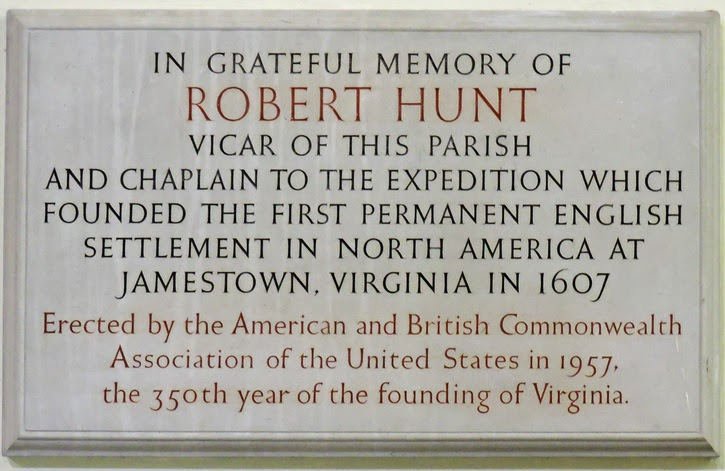
After Reverend Robert Hunt died, the settlers wrote:
"1607. To the glory of God and in memory of the Reverend Robert Hunt, Presbyter, appointed by the Church of England.
Minister of the Colony which established the English Church and English Civilization at Jamestown ...
His people, members of the Colony, left this testimony concerning him. Reverend Robert Hunt was an honest, religious and courageous Divine.
He preferred the Service of God in so good a voyage to every thought of ease at home ..."
Jamestown settlers continued their tribute of Reverend Hunt:
"... He endured every privation, yet none ever heard him repine.
During his life our factions were ofte healed, and our greatest extremities so comforted that they seemed easy in comparison with what we endured after his memorable death.
We all received from him the Holy Communion together, as a pledge of reconciliation, for we all loved him for his exceeding goodness.
He planted the first Protestant Church in America and laid down his life in the foundation of America."
--
American Minute is a registered trademark of William J. Federer. Permission granted to forward, reprint, or duplicate.

Delaware